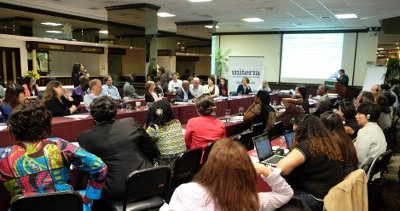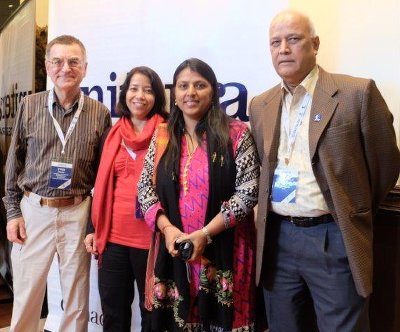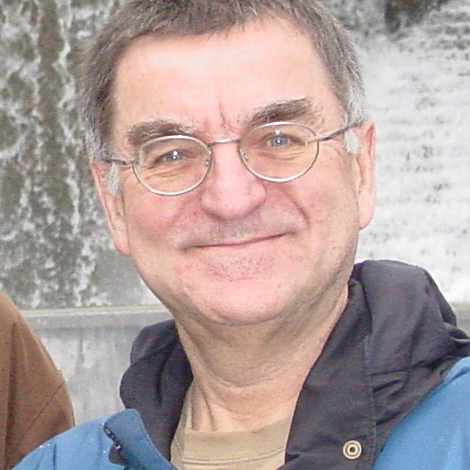This blog post was originally published November 19, 2014 by the United Nations Research Institute for Social Development
 In this update on the progress being made in putting social and solidarity economy on the UN agenda, UNRISD Research Analyst Marie-Adélaïde Matheï reviews its position in post-2015 debates and UNRISD policy and research activities.
In this update on the progress being made in putting social and solidarity economy on the UN agenda, UNRISD Research Analyst Marie-Adélaïde Matheï reviews its position in post-2015 debates and UNRISD policy and research activities.
As the outline of the post-2015 agenda becomes clearer, and sustainable development goals (SGDs) are defined, many actors now ask the question: how are we going to implement the new SDGs? Policy makers, the UN and civil society will soon have to identify existing regulations, forms of production and consumption and partnerships that espouse the ideal of sustainable development. Social and solidarity economy (SSE) has a lot of potential in this regard. Guided by principles of cooperation and democratic decision making, the production of goods and services by SSE organizations comes with explicit social and often environmental objectives. This makes SSE a fundamentally integrative and inclusive approach. However, in the debates over a post-2015 agenda, the potential of SSE has so far been overlooked.
But this is changing. Civil society organizations that have been advocating for SSE for many years now have access to platforms where their voices can be heard. The Intercontinental Network for the Promotion of Social Solidarity Economy (RIPESS), for example, is now forging closer ties with the Trade and Development board of UNCTAD. National laws regulating the field of SSE are becoming more and more common. France, for example, adopted a comprehensive framework law in August this year, which officially recognizes SSE and aims to strengthen networks of SSE organizations and spur cooperative type of entrepreneurship. Since the Social Enterprise Promotion Act came into effect in 2007 in South Korea, the government has put in place tax reduction and financial support mechanisms. As a result, many social enterprises have appeared on the market, and the field received tremendous interest from academia and civil society creating a vibrant SSE scene in South Korea.
The UN has been following a similar trend. The UNRISD conference on SSE held in May 2013 created a momentum of interest among like-minded UN officials, who set up a UN interagency task force dedicated to SSE in September 2013. The task force, which brings together 18 UN agencies, the OECD and four umbrella associations of SSE organizations, meets on a regular basis. UNRISD hosted the secretariat for the first year. A little over a year on, time has come for stocktaking. Thanks to two side events held during UN processes (the Open Working Group on SDGs and the Committee on Food Security of the FAO), members of the Task Force have pushed for a greater recognition of the role of SSE enterprises in sustainable development. The Task Force position paper, Social and Solidarity Economy and the Challenge of Sustainable Development, is another big step in that direction. Co-drafted by all the Task Force members and observers, it illustrates the potential for SSE in tackling eight major challenges of the 21st century: formalization and decent work, greening the economy, local economic development, women’s well-being, food security, health for all, sustainable cities and transformative finance. The task force is now planning future activities. We would like to establish UN-civil society dialogues around SSE to better grasp the needs at the grassroots. Another topic of interest, which will take the form of a second position paper, is the issue of finding financing for SSE organizations. Their practices of profit redistribution and democratic decision making are often at odds with the conventional banking system. UNRISD will be instrumental in the drafting of the paper and will provide necessary background research.
 However, a lot more needs to be done. Among the priorities are developing programmatic work on SSE at the UN level and in partnership with civil society, and supporting the establishment of an enabling policy environment. In this regard, the Task Force offers a convenient platform. A great deal of hope is placed in the International Leading Group of the SSE concerning the policy aspect of SSE. The Group’s first meeting, facilitated by the Mont-Blanc Meetings, took place last September during the UN General Assembly in New York. The Leading Group brings together state representatives, UN officials and civil society actors. It now comprises governmental entities from France, Morocco, Ecuador, Luxembourg, Quebec and Colombia, but there are more states that actively promote SSE.
However, a lot more needs to be done. Among the priorities are developing programmatic work on SSE at the UN level and in partnership with civil society, and supporting the establishment of an enabling policy environment. In this regard, the Task Force offers a convenient platform. A great deal of hope is placed in the International Leading Group of the SSE concerning the policy aspect of SSE. The Group’s first meeting, facilitated by the Mont-Blanc Meetings, took place last September during the UN General Assembly in New York. The Leading Group brings together state representatives, UN officials and civil society actors. It now comprises governmental entities from France, Morocco, Ecuador, Luxembourg, Quebec and Colombia, but there are more states that actively promote SSE.
Not only states, but regional blocs are also showing greater interest in the issue. SSE is part of the working plan of almost all European institutions. The European Economic and Social Committee (EESC) has been a catalyzer in this field, and the institution is now starting to look for initiatives beyond Europe. In this context, Sarah Cook made a presentation at an EESC conference in Brussels last October. And UNRISD will be represented during a working group organized by the Italian government as part of the European Presidency of the European Union.
Research, when it comes to public policies supporting SSE, is crucial. The UNRISD occasional papers series on SSE and the forthcoming edited volume analyse the pitfalls of ill-designed or top-down public policies. Common problems consist of instrumentalizing SSE as a poverty eradication tool or as a substitute for welfare provision. A policy and legal environment favourable to private companies might be disabling for SSE, in that they tend to favour efficiency over equity, managerial and hierarchical culture that ultimately undermine the democratic and inclusive potential of SSE and might result in mission drift for SSE enterprises. Co-construction of public policies involving practitioners is crucial to preserve the sector’s autonomy.
Thanks to its existing research, its active involvement in the UN Inter-Agency Task Force on SSE and close contacts with the civil society, UNRISD is well placed to pinpoint the pitfalls, to further evaluate the real potential of SSE and to tackle tricky issues such as the interactions between SSE and finance. We therefore hope to keep up our work in this field in 2015.
Marie-Adélaïde Matheï, Research Analyst with UNRISD, recently achieved an advanced master degree in International Relations and Diplomacy from the University of Antwerp (Belgium). Previously, Marie-Adélaïde obtained a master degree in Economics from the University of Louvain-la-Neuve (Belgium), during which she took part in a university exchange programme with the Universidad de Chile. While in Chile, she focused on Solidarity Economy, currency design and Time Banking on which she wrote her master thesis.
 Launched this fall, Ethiquette is the first independent, bilingual platform intended for individual investors. It offers information on the full spectrum of responsible investment strategies and products available in Canada, including many CED funds and projects.
Launched this fall, Ethiquette is the first independent, bilingual platform intended for individual investors. It offers information on the full spectrum of responsible investment strategies and products available in Canada, including many CED funds and projects.










 The C2UExpo (Community, College, University Exposition) 2015 Conference, which will be held in Ottawa, from May 26th – 29th, 2015 is calling for papers until December 12.
The C2UExpo (Community, College, University Exposition) 2015 Conference, which will be held in Ottawa, from May 26th – 29th, 2015 is calling for papers until December 12. Do you know an individual/organization that has made a significant contribution to social planning and social justice in BC?
Do you know an individual/organization that has made a significant contribution to social planning and social justice in BC?






 Developing Multiple Enterprises – an Effective Growth Strategy | Nov. 13
Developing Multiple Enterprises – an Effective Growth Strategy | Nov. 13
 This workshop will provide you with knowledge on effective core fundraising practices. Working with specific ideas and questions from their own organizations, participants will work through the essentials of creating and executing a fund development plan. Participants will come away with an overall sense of what is working in their organizations, and where there are gaps and opportunities.
This workshop will provide you with knowledge on effective core fundraising practices. Working with specific ideas and questions from their own organizations, participants will work through the essentials of creating and executing a fund development plan. Participants will come away with an overall sense of what is working in their organizations, and where there are gaps and opportunities.
 Sara Penner is currently a PhD Student at the University of Manitoba in the Asper School of Business. She has 15 years of experience working in fundraising at non-profits; working in Director of Development positions at United Way of Winnipeg and St. Boniface Hospital Foundation. She completed a Master’s degree in Resource Development and Philanthropy and has her CFRE designation.
Sara Penner is currently a PhD Student at the University of Manitoba in the Asper School of Business. She has 15 years of experience working in fundraising at non-profits; working in Director of Development positions at United Way of Winnipeg and St. Boniface Hospital Foundation. She completed a Master’s degree in Resource Development and Philanthropy and has her CFRE designation.  Build & Grow Your Social Enterprise
Build & Grow Your Social Enterprise